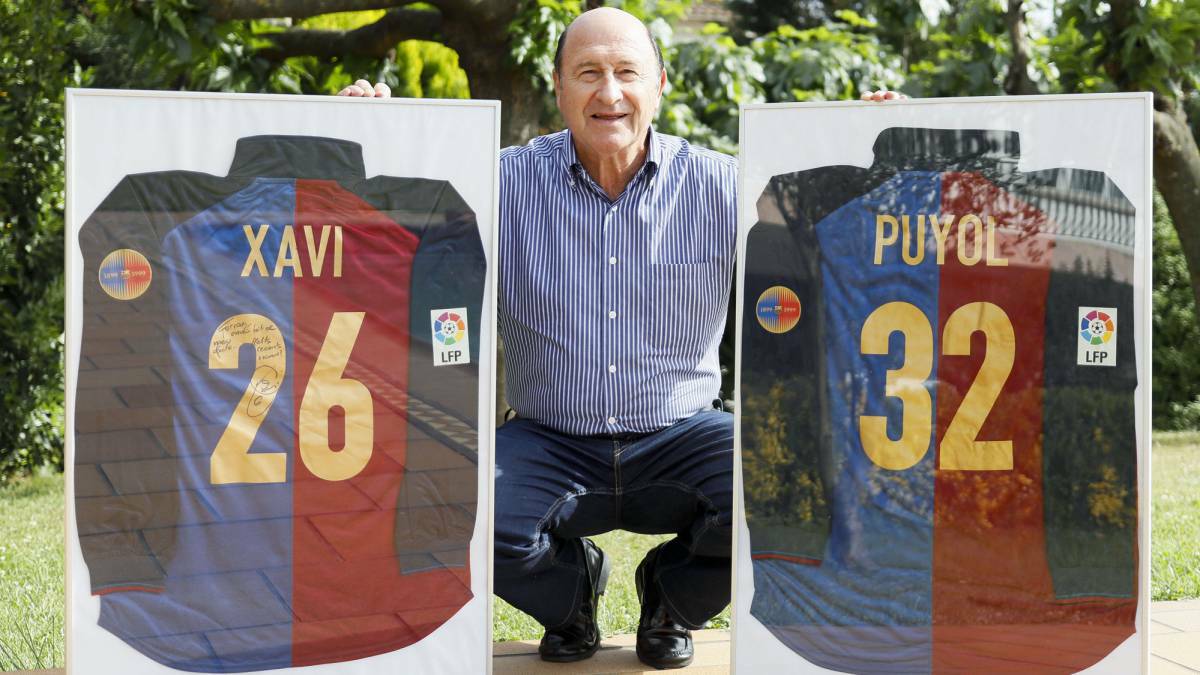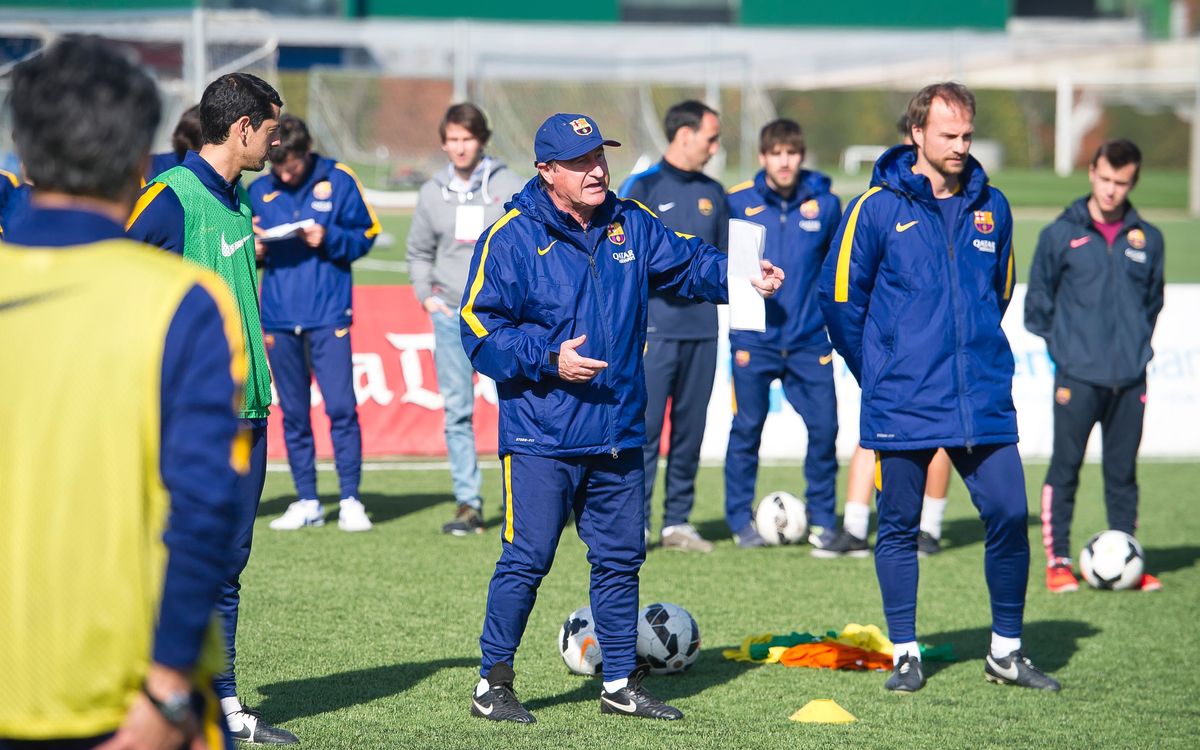World Football Summit speaks exclusively with Joan Vilá Bosch, the former F.C. Barcelona player, coach and director that mentored the likes of Xavi Hernandez and Carles Puyol. This interview features as part of the first edition of WFS Digest, our new bi-weekly insider’s guide to the latest and most relevant thoughts and practises from within the football industry. You can subscribe to WFS Digest HERE.
Joan Vilà Bosch joined F.C. Barcelona at the age of 17 and has belonged to Barça almost ever since. He’s played for them, he’s coached them, and he served as Director of Methodology from 2011 to 2018. At Barça’s famous La Masia youth academy, still in his teens, he met a coach named Laureano Ruiz «who was quite ahead of his time and whose teachings on football stayed with us for good. He devoted time to each of his players, not just to the team as a whole.»
When his time as a footballer came to an end – at 30 and due to injuries – he first considered becoming a coach. Three decades after, his company Go Up pioneers «individual focus» in European football and can showcase some impressive success cases among elite players. Vilà will coordinate the Performance track at World Football Summit 2022.

What was your first project, how did it all start?
It was January 2008. My son and I started coaching Carles Puyol externally to FC Barcelona, whose first-team squad was not doing so well at the time. It was the final season for the likes of Deco, Ronaldinho, and Frank Rijkaard. Puyol was being rained on with unfair criticism. There was a widespread feeling that all he had to offer was his physical strength, so at age 30 he was deemed a wash-out by many. Given our friendship, I offered our services. When he asked how we could help, we said we would study his game, which we already knew, of course; but it’s one thing to see a footballer play and another to analyse his game. Puyol was our first assignment; and in six months he went from being crucified by the media to winning Euro 2008 for Spain and being included in the tournament’s Dream Team. Naturally, all this encouraged us to keep at it.
Was the key to success with Puyol based more in technical, tactical, or psychological issues?
The key factor was analysing some features of his game that he himself was unaware of, thus catching his attention. We encourage self-analysis of one’s game. That in turn led to his self-realisation of certain tactical problems. It was this awareness on his part, together with his humble attitude and tremendous effort, that paved the way to his being voted Euro 2008’s best defender. By May of that year —that is, a month before the competition kicked off— he had gained command and anticipation skills over situations that he had formerly just been reacting to.
What are the main areas of improvement for a mature footballer?
In this day and age, it’s shocking that footballers do not receive the individual attention that they deserve. A team being the sum of its players, its improvement depends on every member’s individual progress. First of all, to form «mini-partnerships», as Jorge Valdano calls them, based on sharing every member’s individual knowledge and improvement. A team is the sum of such mini-partnerships. It improves as a whole by improving each of its members. Needless to say, this takes time and dedication. It is, however, what the players need, but they don’t find or make the time to fit this in.
Luka Modric and Zlatan Ibrahimovic couldn’t differ more, yet they both share a similar intelligence about the game. The question for us coaches is whether they are above benefiting from our help. – Joan Vila
Goalkeepers do receive individual attention, though…
Indeed, and that’s a good point. Why goalkeepers get what their fellow footballers don’t? Because there are more of the latter? While the cost may be prohibitive at an amateur level, on a professional one, with technical teams consisting of five or six members, surely appropriate time can be devoted to each footballer separately.
Can an old dog really be taught new tricks?
Technical aspects largely depend on individual talent in the same way as tactical ones may rely on a given player’s intelligence. Technique improves with daily work and a constant relationship with the ball, starting at the grassroot level. It is all about acquiring coordinative habits. An understanding of the game should also be taught at the grassroot level, because its elements are fundamentally the same: a field, two goals, teammates and the opposing team. The field’s dimensions are named ‘E’, for they are invariable, whereas open spaces are named ‘e’, for they constantly change throughout the game. A player must understand these, learn to open them and know where to run. This turns the physical exercise of running into a cognitive one, since the ball and the 22 players are constantly moving.
Most of a player’s moves and runs are off the ball. What makes players like Luka Modric or Andrés Iniesta more valuable than most is anticipation. Theirs could be compared with chess, except for two huge differences: chess demands anticipating not one next move, but several. Secondly, chess pieces, while undergoing constant positional change, do not feature a football player’s mobility.
Watch: WFS Live’s expert panel looks at how data can improve performance
You mention superior talents who seem to have learnt this from birth…
Exactly. A player’s intelligence helps him understand the game better, which therefore makes him a better player. One almost wonders if players so talented even need coaching at all. Talent, of course, is innate, revealing itself on the physical or technical side of the game. Modric and Zlatan Ibrahimovic couldn’t differ more, yet they both share a similar intelligence about the game, and must have excelled so high in it mainly thanks to their talents. The question for us coaches is whether they are above benefiting from our help. Just as it benefits others who may not have their intelligence, but also play necessary roles.
We at GO UP coach top players internationally. For some years, we have rendered our services in a private, almost confidential manner. Remarkably, all of these stars have candidly admitted their lack of some fundamentals of the game, some of its basic elements. Yes, they grew up as players because of their immense talent, which in turn forged their identities. But no matter how many times they may switch teams, coaches or trainers, they’ll go through their professional lives in their own company, as we always remind them. Self knowledge and management of one’s social environment are key to solving not just one situation, but most of the most crucial ones for them. This task relates to the hasty decisions they must constantly make on the pitch as players, based on everything that surrounds them. As we also tell them, our help is given so that once they have received it, they don’t need us any longer. We don’t intend to perpetuate our coaching. The quality of improvement varies greatly, following no pattern, but there is always a turning point toward self-sufficiency. After three or four years, we may conduct a little review.
Like good psychologists do…
Exactly. And it takes a lot of humility from them, professional players, some of them international. So often, after one has reached a certain status, it may seem to them that they have nothing to learn. Being humble helps one to be receptive to help. Analyse your game and optimise your performance to achieve your best self as a player, if not 10 out of 10. And never hear a thing from us against the principles of your team’s coach; not only out of respect for him as our colleague, but also because logic dictates that what’s best for the player is in everyone’s best interest.
Has the last decade’s technological progress impacted your work a great deal?
Without a doubt. We have always relied on video. It helps keep track of the goals we set for them. Everything important in life involves setting goals, whether short, mid, or long term. Short-term ones tend to be unambitious. Ambitious goals are rarely achieved in the short term. Long-term goals, on the other hand, require perseverance that not everyone has. Whatever the goal, once is set, we pursue it together as a team. If our players succeed, then so do we.
Finally, what role have you had in the training of Xavi Hernández as a coach?
Our relationship has been permanent and close, not only on a football level, but also on a personal and family one. One year before he finished his stage as a professional player at Al-Sadd, Xavi contacted us to help him and his future technical team. That year, which included a stay in Qatar, our relationship strengthened further.
Xavi has been, without a doubt, one of the best midfielders in the world during his long sporting life. And now he has returned to FC Barcelona as a coach with a difficult but exciting challenge: recovering the game model that illuminated the world for many years and was the mirror in which many clubs, coaches and players have wanted to reflect. He is perfectly aware of the difficulty that all this implies, but no one better than him can carry it out, because he is the one who best knows the club and this DNA and of which he has been the clearest exponent as a player. In addition, he’s intelligent, hard-working, honest and very demanding. So I have no doubt that he will achieve this goal.
This interview features as part of the first edition of WFS Digest, our new bi-weekly insider’s guide to the latest and most relevant thoughts and practises from within the football industry. You can subscribe to WFS Digest HERE.

